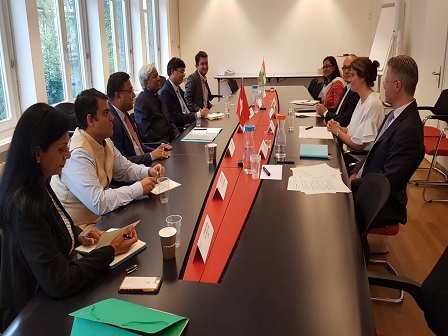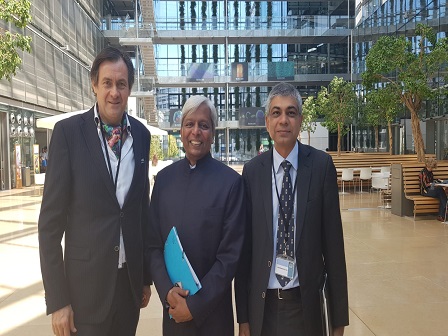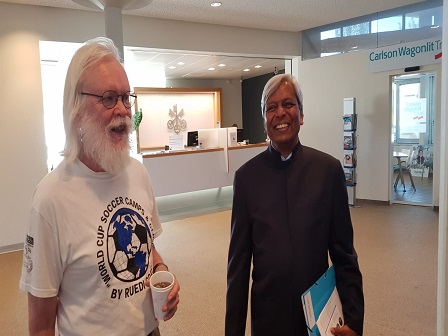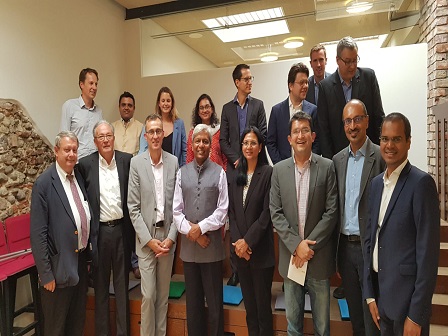Moving towards closer scientific ties with Switzerland
Visit of Principal Scientific Advisor to the Government of India, to various scientific institutions in Switzerland opened up new avenues for closer scientific collaborations between the two countries.

Professor K. VijayRaghvan, Principal Scientific Advisor, visited Switzerland from 2nd to 5th September 2019 touring several scientific institutions like the European Organization for Nuclear Research, the Campus Biotech and attended meetings with eminent scholars including President - Prof. Andrea Schenker-Wicki and others at the University of Basel. Moreover, promotion of outreach and knowledge transfer to India has been discussed with CERN to envisage a permanent exhibition and its presence in the country to engage in more outreach. Further, the participation of India in accelerator related projects and applications has created many opportunities, and closer cooperation on this front was envisaged.
The University of Basel expressed its keenness in building collaborations with India, especially in the field of life science and health innovations. Prof. VijayRaghavan shared some of the collaborations from India with Uni of Basel, including his the collaboration with late Prof. Heinrich Reichert at the University of Basel. They both shared their excitement about building Indo-Swiss Life Science Innovation Corridor, between C-CAMP and the University of Basel, where C-CAMP and Uni of Basel could become a gateway for collaboration between innovators from two countries. Digital Health was indicated as a focus area for this collaboration, including potential work with Foundation Botnar. Further, they discussed clinical work done in the field of vision/ophthalmology by Prof. Scholl at the Institute for Molecular and Clinical Ophthalmology. Professor VijayRaghavan indicated that there is an amazing opportunity to develop cost-effective new approaches using Induced Pluripotent Stem Cells (iPSC) derived cell therapy for vision disorders

The University Of Basel is pursuing an MoU with CCAMP to allow them to leverage institutions ecosystem of startups and vice versa for health aided services. The application of blockchain technology for medical data is also identified as an area for potential partnership. Moreover, PSA requested the University to participate in the Bio-Asia Meet in Hyderabad scheduled on January 2020.
In the round table, discussion on Digital Health and possible avenues for further collaborations were widely discussed. A presentation was made by Mr Amandeep Singh Gill, Executive Director, Secretariat of the High-level Panel on Digital Cooperation (ex officio) Geneva on the health sector where he briefly discussed the ongoing data sharing proposals in the digital health sector. He also spoke on the recommendations made on the proposal from Report of the UN Secretary-General’s High-level Panel on Digital Cooperation. He also intimated that the World Health Assembly had set a goal under which one billion more people benefit from universal health coverage (UHC), better protected from health emergencies and will enjoy better health/well-being. He also spoke on the noticeable activities of WHO in the year 2019.

In discussion with Prof. Dr Martina Hirayama, State Secretary, State Secretariat for Education, Research and Innovation (SERI) essential mutual research interests were deliberated upon. SERI supports a number of initiatives, including Swissnex and Innoswiss, which encourage innovation, research, and Industry partnerships in Switzerland and abroad. Indian Government has a number of similar initiatives, especially the Accelerating Growth of New India’s Initiatives (AGNIi), which aims to connect global problems with Indian entrepreneurs and researchers. There is tremendous scope for AGNIi to partner with SERIs initiatives. Moreover, Swissnex has identified four areas for collaboration between India and Switzerland, namely Renewable Energy, Science for Society, Health Tech, and Knowledge to Action. Switzerland has a well-developed drone policy which can inspire India’s attempts at developing a similar policy framework.
Switzerland has a National Science Foundation (NSF), which has successfully funded research, with a very high proportion of proposals supported. India is embarking on setting up a National Research Foundation (NRF), which can learn, from NSF’s lessons and partner on joint calls. Apart, Switzerland’s NSF is jointly finding research calls with DBT and DST and joint panels for evaluation of proposals need to be streamlined.

Mountain research is a major area for potential collaboration between India and Switzerland, and there is a need to build upon the current joint research funded by the Swiss Agency for Development & Cooperation (SDC). Other essential niche areas that were discussed involves health data, clinical research, and biomedical training, Swiss-India blue-sky research programme, the energy sector (Solar Panels, Hydrogen cells, Battery cells). Likewise, Cooperation in the field of water, technology, and engineering, cellulite, along with the idea of developing smart cities Idea was outlined.

Various bilateral issues were discussed on the Indo-Swiss relationships on table dinner meeting at the residence of Ambassador of India to Switzerland, Liechtenstein, and Holy See. They especially emphasized the issues of start-ups in the sector of Science and Technology. The Momentum in India: Swiss SMEs Programme (MISSP) of the Embassy in the sector of Small and Medium-size enterprises was also discussed, wherein the Embassy has already enrolled 33 Swiss companies on ease of doing business and investment. The functioning of PSA’s Office to bridge various departments of mutual interests, like the Ministry of Science and Technology, Department of Space, Ministry of Health and Family Welfare, NITI AAYOG, etc. Swiss expertise in various fields and their process of planning various projects was also discussed. The Swiss side welcomed the Embassy’s initiatives to celebrate 2019 as India Year of Science & Technology.

Campus Biotech is a Swiss centre of excellence in biotechnology and life sciences research focusing on three domains: Neuroscience & Neurotechnology, Digital Health, and Global Health. PSA met a few prominent scientists and research fellows during his visit to the premises and had a useful discussion with them. He also ensured that a high level delegation would be sent for the World Health Forum meeting in Geneva during March 2020. Further, PSA Prof. VijayRaghavan visited Mrs. C. Warakaulle, Director for International Relations along with Head of Associate Member and Non-Member State Relations E. Tsesmelis, Beams Department Head P. Collier and CERN Senior Physicist A. Sharma. They discussed a cordial and productive exchange, with an introduction to CERN activities and initiatives. PSA expressed appreciation for the welcome at CERN and also for the exhibition in India, DG-CERN’s Fabiola’s visit to Bengaluru.
In roundtable Meeting on Indo-Swiss Mountain Research on water conservation and possible avenues for further collaborations at the University of Berne, essential discussions were made on environmental and climatic subjects. It includes coalition for mountain research, past & current countries, rapid mass movements and important mutual collaboration and initiatives.
Moreover, in the meeting with Annalise Eggimann, CEO, Innosuisse, Swiss Innovation Agency possibilities of fundraising for the research work was discussed. The Swiss side ensured to work closely with their Indian part to promote all startups in all science and technology sectors.
The new avenues opened up by the visit of PSA to Switzerland and the recent visit of DG-CERN to Vigyam Samagam at Bengaluru can help escalate the scientific excellence in the two countries.